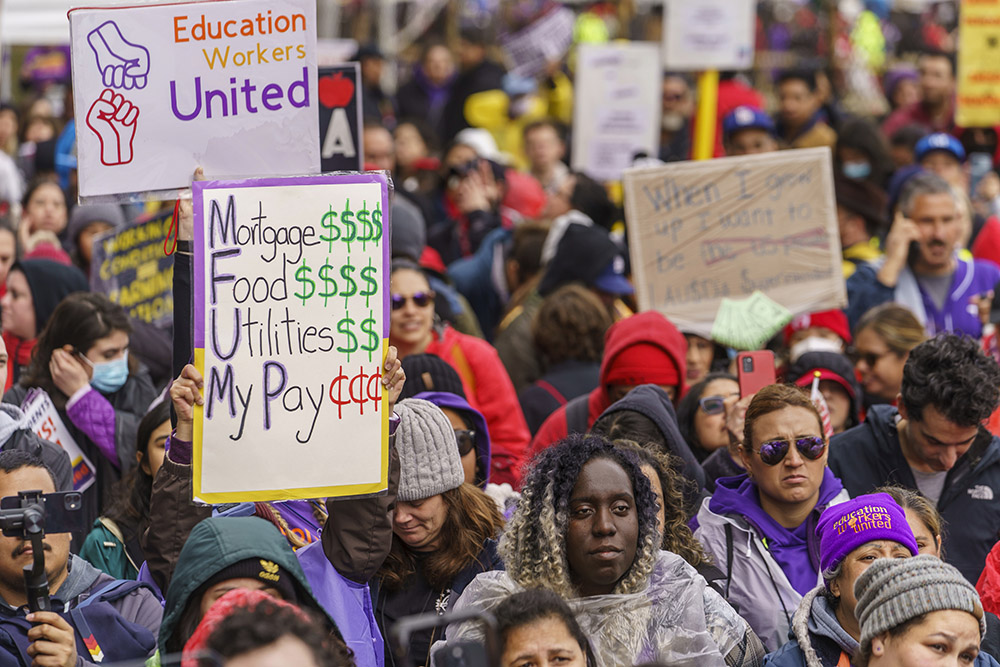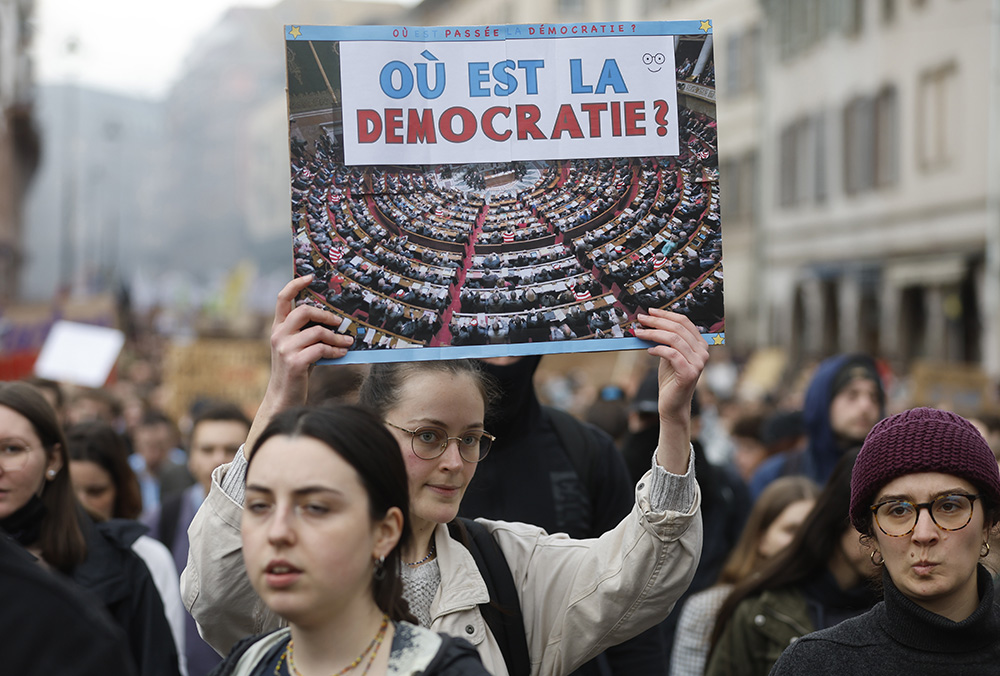
Thousands of Los Angeles Unified School District teachers and Service Employees International Union 99 members rally outside the school district headquarters in Los Angeles March 21. (AP Photo/Damian Dovarganes)
None of us were privy to the internal discussion when the members of the Federal Reserve met this week. We know they were assessing the bank failures and the Fed's bailout program, and how they would affect the inflation rate. The Fed added $300 billion to its balance sheet, the kind of thing that risks stoking inflation, but they thought increased scrutiny over loans in light of the bank failures would offset that risk. They decided to raise the benchmark interest rate a quarter of a point.
The Fed's discussions are held privately, which may not stoke inflation, but which certainly stokes suspicion.
To be fair, in this age of social media, of journalistic exposés and salacious autobiographies, of interviews with Oprah and the relentless, deadening drumbeat of TikTok and Instagram, it is difficult for anyone to have a frank conversation. Ours is an age when preening for the cameras is the first requirement for running for office, pollsters dictate policy, and celebrity matters more than thoughtfulness. In such a world, insulating decision-makers from public scrutiny, at least for a few hours, may not be an entirely bad thing.
With those caveats in place, it is one of the premises of American democracy that it is better to make decisions in public, and that the best way to balance the right to speak about our politics with a sense of responsibility is by requiring the speech to be in public and open to questioning. Six or seven weeks hence, our town will hold its annual town meeting, in which is vested all legislative and executive authority, as it has been since the 17th century. There is a lot to be said for requiring people to say what they have to say in public.
The Fed should ask itself why it is that the government always bails out the banks but never bailed out the struggling communities of middle America when the jobs were offshored.
How to balance these two impulses? I will stipulate that it is good that the members of the Federal Reserve could meet in private, but I also hope the room in which the Fed held their meeting had a television, and that it was tuned to news showing images of angry people in the streets.
In Los Angeles, school custodians, bus drivers, cafeteria workers and other non-instructional personnel formed picket lines for the second day of their strike. There are a variety of grievances the workers brought to the table, but the underlying issue is that it is impossible to live with dignity on the salaries these jobs provide. Income inequality is the core problem.
In Paris, protesters have marched through Paris for weeks, objecting to President Emmanuel Macron's decision to raise the retirement age. Last month, while I was visiting the City of Light, friends worried that Macron's determination in the face of widespread popular opposition was only pushing centrist voters into the open arms of more extreme parties, especially that of the quasi-fascist National Front leader Marine Le Pen.
The manner in which Macron pushed the reform through, using a constitutional provision to avoid a straight up-or-down vote in parliament, rubbed more salt in the wounds.

A protester holds a placard that reads, "Where is democracy?", during a rally in Strasbourg, France, March 23. French unions are holding mass demonstrations after President Emmanuel Macron enflamed public anger by forcing a higher retirement age through parliament without a vote. (AP/Jean-Francois Badias)
In an interview this week, when asked about any regrets he has, Macron said, "Having failed to convince people."
In a democracy, that is a big problem. Writing in The Washington Post, opinion writer Rokhaya Diallo was withering in her critique: "It should come as no surprise that unruly crowds have gathered near the chamber of parliament for the past week to express both their astonishment and their sense of dispossession from the democratic process."
Dispossession. The word choice is exact. More important than whether the Fed makes its decisions in public or behind closed doors is whether or not the decisions it makes are responsible to the American people. The Fed should ask itself why it is that the government always bails out the banks but never bailed out the struggling communities of middle America when the jobs were offshored. Why it is that the rich get richer and are never made to pay their fair share as part of a renegotiation of the social contract? These are questions for legislatures and presidents as well.
Pope Francis warned us about the danger in his programmatic 2013 apostolic letter Evangelii Gaudium. "Just as the commandment 'Thou shalt not kill' sets a clear limit in order to safeguard the value of human life, today we also have to say 'thou shalt not' to an economy of exclusion and inequality," the pope wrote. "Such an economy kills." It may be killing democracy, too.
Advertisement
In Beverly Hills, many people drive expensive Land Rovers that have likely never actually been in direct contact with land. But the people who clean the schools where Angelenos send their children do not get paid a living wage. And we wonder why they are angry.
In Paris, Macron did not begin restructuring the social contract by insisting that those whose wealth has exploded in 40 years of neoliberalism step up first. No, he told the working stiffs they can work another couple of years.
Here in the U.S., David Sacks, one of the Silicon Valley geniuses who was lobbying for a bailout, wrote about a "small non-profit school" that had its deposits at Silicon Valley Bank, and that would have been indelibly harmed if it could not access the funds. He redacted the name of the school but our friends at the American Prospect were able to figure out that the school in question is the elite North County School in upstate New York where tuition is $62,000 per year.
And we wonder why Le Pen and Donald Trump are seen as attractive? If the political and economic system fails to treat people with dignity, they will turn to politicians who promise to blow the system up. More important than whether or not the Fed meets in private or in public is whether or not our political system is capable of making responsible decisions.





